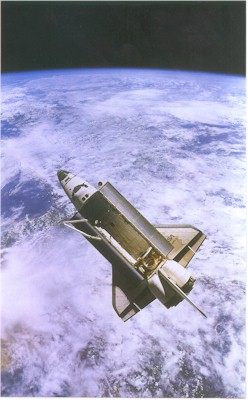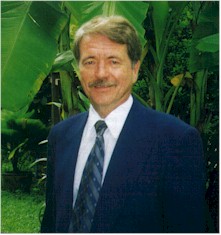MAXIMIZING YOUR CINEMA ENJOYMENT
Jim Patterson
Canadian Jim Patterson is the General Manager of MajorMax Co., Ltd. His company recently opened Thailand's largest entertainment complex - the Major Cineplex Ratchayothin. Located across from the Siam Commercial Bank complex in Bangkok, it features fifteen theaters including a seven-storey IMAX screen, the first in Thailand and the largest in the world.
First, a little about Patterson's background. He has two degrees from the University of British Columbia: an Honors B.Sc. in Physics, and an MBA. After graduating, he worked with IBM for a while, but he's probably best known for his stint as the B.C. Rentalsman (the equivalent of a deputy minister). For ten years, he was in charge of B.C.'s Landlord Tenant Law and he had to resolve disputes in the rental housing market. It was a very high profile job because it was often controversial. He ended up recommending the removal of rent controls and in the process ending up phasing himself out of a job.
With money he had raised in Canada, Patterson then moved on to build a boutique hotel in Lahaina, Maui called the Plantation Inn and he lived in Hawaii for seven years. In 1990, he thought of building a similar hotel on a larger scale in Phuket, but the property market here started experiencing problems.
Patterson almost had the financing put together for the hotel several times but at the eleventh hour the talks collapsed, as the market just got softer and softer. But he did meet a lot of people and developers during those negotiations, so he decided to move to Thailand six years ago when he helped open a hotel in Pattaya. In the process, he was asked to do a feasibility study on entertainment.
"I found it easy to switch into the entertainment business from the feasibility and project management field. There are a lot of parallels," Patterson says. "At that time there was growth in the entertainment field here in Thailand. So I started filling a void in South-East Asia by representing a number of North American entertainment companies and providing engineering services for them.
"We started off by doing simulation theaters. The first was `Motion Master' in Pattaya. Then American entrepreneur Bill Heinecke hired me to put in the Ripley's Believe It Or Not. I spent a year doing that, and then we put in other simulators in Seacon Square, Rangsit and Pinklao. We also installed some simulators in the Philippines, and we also did some animatronic and light shows too. About a year-and-a-half ago we started representing IMAX. We also put in a few IMAX simulation theaters in the Philippines, and here in the Major Sukhumvit project."
So what is a simulator? "It's a theater where the seats move. It is really like a ride. It's a four minute action film, taken from the perspective that you are in a vehicle, or something that's moving. The seats move in synchronization with the action of the film. You get the feeling that you are actually taking the ride whatever it is. It's very different from an IMAX giant screen theater. It's really more of a ride, you are not going so much to see the film as to experience the ride."
Patterson's IMAX project here in Thailand is a joint Australian-Thai venture, but the Managing Director of the Australian company, Cinema Plus, is a Canadian named Mr Brian Hall. The Thai company is Major Cineplex and their Managing Director is Vicha Poolvaraluck.
"It was very difficult to put the project together because of the baht devaluation," Patterson says. It went ahead though because the Australians provided the US priced equipment and the Thais supplied the land, building and fit-out. While putting the project together, I realized how very difficult it would be to entice further investment into this region. Normally, for a project like this, I put together the money and the deal, manage the installation and then move on. But this time MajorMax asked me to be the general manager, and partially due to the economy and partially because it's very interesting and a big project, I agreed to stay on manage IMAX full-time (my previous company was Omni Entertainment)."
 Tell us a little about IMAX. "It is the fastest
growing form of out-of-home entertainment that there is. It's enjoying tremendous
worldwide success. The stock is doing well, the company is doing well, and the theaters
are doing well. It's a very successful business. It doesn't use the same film format as
normal cinemas. Each film frame is ten times the area of 35mm, and five times that of 70
mm. It is then projected on to a large screen, twenty meters high or more (five to ten
times the size of a normal screen). The film moves very fast. It's an experience - a giant
screen with a sharp, sharp image on it. The 12 & 1/2 kw bulb is so bright that it has
to be water-cooled. It's the only bulb in the world that requires this. One lightbulb is
worth US$10,000.
Tell us a little about IMAX. "It is the fastest
growing form of out-of-home entertainment that there is. It's enjoying tremendous
worldwide success. The stock is doing well, the company is doing well, and the theaters
are doing well. It's a very successful business. It doesn't use the same film format as
normal cinemas. Each film frame is ten times the area of 35mm, and five times that of 70
mm. It is then projected on to a large screen, twenty meters high or more (five to ten
times the size of a normal screen). The film moves very fast. It's an experience - a giant
screen with a sharp, sharp image on it. The 12 & 1/2 kw bulb is so bright that it has
to be water-cooled. It's the only bulb in the world that requires this. One lightbulb is
worth US$10,000.
"The sound also immerses you - there is an incredibly good sound system. You vibrate with the action of the film. The idea of IMAX is to bring you into the picture to give you an opportunity to experience as close as you can to what it would like to be in the places pictured on the screen.
"The most successful IMAX film last year made the cover of Time because IMAX cameras were taken on that tragic trek up Everest. It gave you an incredible perspective of what it was like to climb the world's tallest mountain.
"And the second part of IMAX is the new 3-D technology which uses crystal head-set glasses - not the old red and blue kind. They switch electronically, so you get an extremely sharp image. Also because of the size of the IMAX screen, this technology can bring objects to within a foot of your face and they are perfectly clear. It's quite a spectacular experience and something most Thais will not have witnessed before."
How much will it cost to see a film? "We are maintaining the IMAX percentage premium, so this will be the cheapest theater of its kind in the world. But we have bought the top absolute best equipment we could get. We will have top-quality seats that recline - its very, very plush. The regular movies will be Bt100, it will be Bt120 for an IMAX film, and Bt150 if it's in 3-D. The headsets are also machine cleaned every time. There will be discounts for children and students, and there will be IMAX cards that give Bt20 discounts. So people can end up seeing these IMAX films for Bt100 if they go to a few films. The capital cost of an IMAX theater is about ten times that of a normal screen. So it will certainly be a bargain."
What about film selection? "All IMAX locations change slower than normal cinemas, but we will run three or four films at a time. Because we an Australian partner, we have access to a lot of films. It will be determined by market demand. We don't show Hollywood productions because they are a different format. IMAX is at an interesting threshold in its development. It's been around for about twenty years, but it developed slowly. Until recently when it started to explode. Initially IMAX was in museums and planetariums but now its in cinema complexes. We are in a transition state with the films because for the first time we are seeing there is enough critical mass for the Hollywood producers to suddenly get interested in IMAX. There are 160 theaters installed worldwide, and probably by the end of 1999 there will be another 100 cinemas or so. There are enough cinemas now that it probably makes sense to start doing some Hollywood style films."
What about length? "The films run for about forty-five minutes (although there is a Rolling Stones IMAX film that is about two hours). As they are an assault on the senses, and so absorbing, you probably would be uncomfortable if they went on for too much longer anyway. And remember, these films are so costly to make as well.
"It will probably take a little while for Thais to get accustomed to IMAX films. They aren't love stories after all, and the films are G-rated, so there isn't much violence. They are reliable so people can always bring their children, but they are not targeted towards children as young adults and university students will love these films."
What about the content of the films? "IMAX films are stories, but they have an educational component as well, they are no longer just travelogues. They are technically correct so they can be used as educational tools as well.
"There is a new IMAX film called T-Rex and the special effects are fabulous. It's about a girl in a museum on dinosaurs who goes back in time. They effects are the same quality as in Jurassic Park but it's in 3-D, so you have these dinosaurs running through the theater. It's a new development in entertainment and opens up so many possibilities as to what can be done.
"One of the films we are opening with is called African Elephant Kingdom. It follows a family of elephants, and what they go through and the problems they face. There is a scene in the film where a full grown African matriarch elephant is charging at you, and you shake from the rumbling in the theater."
Patterson is hoping that a million people will visit Thailand's 600 seat IMAX theater in it's first year of operation. A similar number visited Sydney's first IMAX theater when it opened last year.
For further info contact Jim c/o:
Tel: (661) 610-9105
E-mail: jpatterson@imax.com
Finis

